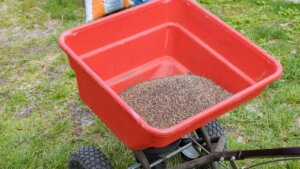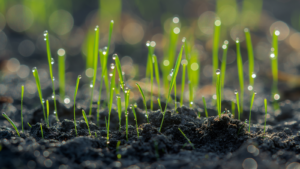Are you ready to transform your landscape into a thriving, verdant paradise? Watering new grass seeds is pivotal in kick-starting the journey toward a lush lawn. Yet, the art of knowing precisely when to taper off can make or break your gardening success. This guide demystifies the process, offering invaluable insights into nurturing your new lawn from seedlings to full-blown green glory.
Key Insights:
- Finding the Perfect Watering Balance: Learn how to maintain ideal soil moisture without overdoing it.
- Understanding Seed and Soil Needs: Tailor your approach based on grass type and local soil conditions.
- Strategic Watering Techniques: Discover the best practices for watering frequency and amount as your new grass takes root.
- The Role of Professional Lawn Care: Uncover how experts can elevate your lawn to its peak potential.
Embark on this journey to ensure your new grass seeds flourish into a healthy lawn. By embracing these strategies, not only will you boost your curb appeal, but you’ll also create a refreshing outdoor sanctuary for enjoyment and relaxation.
Water New Grass Seed: The Initial Phase
Watering new grass seeds correctly from the start is crucial for a successful germination process. The goal is to keep the soil moist but not waterlogged, as too much moisture can lead to seed rot, and too little can cause the seedlings to dry out and die. Here’s how to strike the perfect balance:
- Frequency of Watering: Initially, water your new grass seed 2 or 3 times each day, ensuring the top inch of soil remains consistently moist. This frequent watering supports the delicate germination process, preventing the seed or sprout from drying out.
- Amount of Water: Aim for about 5 to 10 minutes per watering session in the early stages. Using a lawn sprinkler can help distribute water evenly across large areas, ensuring all seeds receive adequate moisture.
- Adjusting to Weather Conditions: Cooler temperatures and overcast days may require less frequent watering, while the heat of the day during occasional heat spells might demand more attention to keep the soil moist.
Seed: Understanding the Needs
Each type of grass seed has unique water requirements influenced by soil type, weather conditions, and the seed’s own characteristics. Here are some considerations for tailoring your watering strategy:
- Soil Type and Water Retention: Sandy soil drains quickly and may require more frequent watering, while clay soil retains moisture longer, potentially reducing the need for water.
- Grass Seed Variety: Cool-season grasses typically need more water in their initial stages compared to warm-season varieties, as they are often planted in the spring or fall when temperatures are cooler.
- Monitoring Growth: As new grass seeds sprout and begin to grow, reducing the frequency of watering encourages deeper root development, leading to a more resilient lawn.
Watering New Grass: Transitioning to a Mature Lawn
Transitioning from seed to sod involves gradually reducing your watering frequency, allowing the new grass to adapt and strengthen. Here’s how to manage this critical phase:
- Reduce Frequency: Start by extending the time between watering sessions, moving from daily to every other day, and eventually to just 2 or 3 times a week.
- Increase Watering Duration: As you reduce the frequency, increase the duration of each watering session to encourage deeper root growth. A longer soak allows water to reach further into the soil, supporting the development of a healthy root system.
- Observing the Lawn’s Response: Watch for signs of stress in your lawn, such as discoloration or wilting, which might indicate a need to adjust your watering schedule.
Lawn Care: Professional Insights and Local Considerations
Even with the best DIY efforts, achieving the perfect lawn in regions like Collegeville, PA, can benefit from professional insights, especially when considering the local climate and soil conditions unique to the area. Here are a few reasons to consider professional lawn care services:
- Expertise in Local Conditions: Professionals have a deep understanding of the specific challenges and advantages of your local environment, tailoring their approach to ensure the best results.
- Time and Cost Efficiency: Leveraging professional services can save both time and resources in the long run, avoiding the trial and error that often comes with DIY lawn care.
- Advanced Techniques and Tools: Lawn care experts have access to advanced tools and techniques that can significantly enhance the health and appearance of your lawn, from specialized sprinkler systems to custom fertilizer mixes.
Cultivating Excellence: Your Guide to a Vibrant Collegeville Lawn
Embarking on the journey of watering new grass seed is the first step toward sculpting a sanctuary of tranquility and beauty in your own backyard. In Collegeville, PA, the success of your lawn begins with understanding how much water your grass seed truly needs to trigger healthy seed germination and support grass growing vigorously across all lawn areas.
This guide has armed you with strategies to navigate the nuances of lawn hydration from seedling to maturity, emphasizing the need to water more frequently initially and then adjust as your lawn establishes itself.
Essential Strategies for a Flourishing Lawn:
- Balanced Hydration: Finding the sweet spot for how much water to use is crucial—enough to keep the seed moist and promote seed germination without overwhelming your new lawn with a ton of water.
- Responsive Watering Practices: Adapt your watering frequency to provide adequate moisture, essential for your grass to grow strong and healthy.
- Deep Watering for Deep Roots: Transitioning to deeper, less frequent watering sessions encourages roots to dive deep into the soil, establishing a robust foundation for your lawn.
- Expertise in Local Lawn Care: Consider leveraging professional lawn care services for their understanding of Collegeville’s specific climate and soil types, ensuring your lawn areas receive the precise care they need.
By meticulously managing every drop, you not only facilitate a vibrant germination process but also lay the groundwork for a lawn that’s resilient, lush, and a source of pride.
Remember, achieving the perfect Collegeville lawn is a blend of science and art—requiring an understanding of when to start and when to stop watering new grass seed, how much water is just right, and the best times to rely on the expertise of professional lawn care services. Your efforts today are the seeds of tomorrow’s green oasis, a testament to the care and foresight you’ve invested into every inch of your lawn areas.



